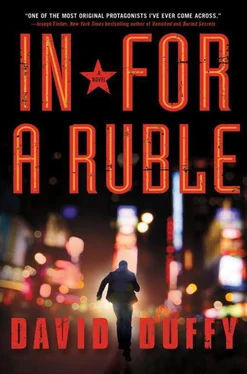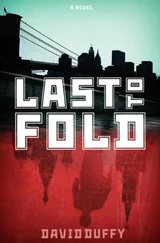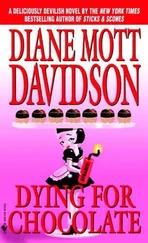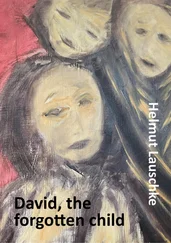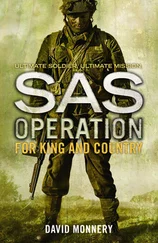“The Leitz kid. Foos. Me. ConnectPay servers. Which I came by without breaking any laws that I know of.”
She didn’t say anything for a minute.
Then, “It’s a good thing for you—I think—that you arranged that wake-up call from Foos this morning. Not that I was getting much sleep. I was worried sick.”
“I’m sorry. I haven’t been in a place where I could call.”
“You have time to explain?”
“I’ll tell you all about it. Can we meet at your place? Noon?”
“Why my place?” Her voice was suspicious.
“I’ve got business uptown. Then I’m probably on the move again.”
“On top of everything else, you’ve turned into a gypsy. Okay. Noon.”
Beria appeared, shaking his head.
I caught the tail end of the rush hour and reached East Sixty-second Street at 10:45 A.M. The sky was dark gray and presaged more bad weather. 1010 WINS confirmed the forecast—another storm on the way, possible accumulations of eight to twelve inches. With only two days to recover from the last one, everyone was back on blizzard alert.
Snowbanks packed the side streets, parked cars crusted in place, covered in dirty white. I found a vacated spot on Leitz’s block, full of shoveled snow, and forced the Explorer in. The same Filipina maid answered the door, and I climbed the two flights to his office. Impossible to pass through the Rothko chamber without pausing for one revolution of mystical color. I’ve never taken psychedelic drugs, but I had the idea that this was what it could be like. I pushed on.
Leitz was at his desk, under the Kline. The Malevich was in its place, and I felt two tinges of regret. One for Leitz. His life was probably over, at least as he’d known it. The other for the painting, which was unlikely now ever to grace my wall. Fate having its fun once again.
“Where’s Andras?” Leitz said, angry.
“Still safe.”
“I thought you were bringing him.”
“You don’t want him here, for all kinds of reasons.”
“What the hell’s that supposed to mean?”
I took the copy of Daria’s note from my pocket, unfolded it and placed it on his desk, smoothing the crinkled paper. Then I stood back, out of range.
He read it, looked away and reread it. He turned the paper over and back again and read it one more time. When he looked up, he had tears in his big eyes.
“Where’d you get this?”
“Your brother, Thomas. Daria left it when she… Thomas was the first to get there and he took it. He’s been holding it over Coryell ever since. I know for a fact Coryell’s been paying Thomas’s bills whenever they got out of hand.”
He dropped his head and shook it. “Jesus. I thought… I thought we had that worked out years ago.”
“Hard for some to kick their addictions.”
He shook his head again. “Thomas, Marianna, Julia, and Walter—I’ve made a hash of all of it.”
He didn’t include Andras in the list. I waited.
He held up the note. “Does Andras…?”
I nodded. “He tried jumping from the Regency last night. That’s the broken glass. He blames himself.”
“Blames himself?” Leitz looked confused, and I had to assume the confusion was sincere. Memory can do that, rearrange history, along with responsibility, if you let it. The Soviets were masters of this kind of manipulation—they twisted the collective memory of an entire nation. The current crowd plays the same games.
“He blames himself for what happened to Daria,” I said, taking another step back. “For not doing anything about Coryell.”
“But it wasn’t…” Leitz pounded the desk with both fists. “IT WASN’T HIS FAULT!”
He looked around for something to throw, but the desktop was clean, except for a pad and some pencils. He swept those away. His face reddened and he started to rise, fists still balled. I got ready to powder.
He made it halfway up before he collapsed in his chair. His head fell on his arms. I stayed where I was, unsure what he’d do next.
He sobbed—and sobbed some more. A long time, maybe ten minutes. I hoped it was catharsis. When he finally looked up, he said, “It wasn’t his fault. Don’t you understand that? You have to understand. It wasn’t his fault. It was… It was mine. ”
I’m not sure who he thought he was talking to. He seemed to be appealing directly to his son. Maybe, in grief and confusion, he transferred Andras onto me. Not so odd—I’d spent the last several weeks talking to a man who’s been dead since 1953. I nodded slightly, to show I did understand, and said nothing.
“What…? What should I do?” he whispered.
“Tell me what happened two weeks ago. Tuesday. You went to Queens, right? To see Coryell?”
He looked confused again at the change of subject. Then the eyes clarified. “Yes.”
“You talk to him?”
“Yes.”
His voice was still at whisper level. He knew where we were headed, alarms were sounding in his head, but we were beyond his ability to do anything about them.
“He tell you he’d just bailed himself out of jail?”
“That’s right.”
“After he was caught with a kid in his car?”
Leitz nodded.
“That when you killed him?”
He looked around as if help might be coming from somewhere. He didn’t really expect it. When it didn’t show, he looked down at the desk.
Another long wait. But when he looked back up, he whispered, “Yes.”
I took the chance of coming into range, taking the chair across the desk. Eye level seemed important. I brought my own voice down.
“Tell me.”
He looked around again. Still no help coming.
“I… I don’t know where to start.”
“Start anywhere, as someone once said.”
“Walter… Walter had a problem, but you know that. He called it ‘the Urge.’ He thought he could control it. But…”
“It ended up controlling him,” I said.
“That’s right. I didn’t know that back then. The first thing was Andras, obviously. We got him help, child psychologists who specialize in this kind of thing. That seemed to work. But…”
He stopped and looked around again. Help still didn’t arrive.
“I guess I was wrong about that too. The question I kept asking myself, after that day Julia walked in and we all came to realize what we were dealing with, is how am I supposed to analyze this? It’s not the kind of question you ever expect to face. What am I supposed to do? How do I stop the pain? It’s not long before you get to the question of who don’t I want to hurt? Or hurt least? It’s hard to come to grips with the idea that pain is inevitable for someone, and you’re the one who decides who hurts and who walks away. That’s where I found myself. I won’t tell you I made the right decisions, I don’t know. Everything appeared in shades of gray, and I just don’t know.”
I knew the feeling.
“I made a calculation. We did what we could for Andras. That was the first thing, as I said. The question was, did we turn Walter over to the authorities? Julia was just getting her business off the ground. She’s a pain in the ass, but she’s so good at what she does, and for better or worse, she loves the guy. Scandal would have killed her. I was raising money. My second fund. Scandal would have killed me too. I’m not afraid to say it. I didn’t want to inflict pain on myself. So we made sure Walter got therapy—far away and out of sight. You can say it, if you want, but, yes, we swept it under the rug.”
I wasn’t going to say it. And I wasn’t going to point out that Thomas Leitz already had.
“The therapy seemed to work. So Julia claimed. Things returned to normal. Pauline was the most adamant but she calmed down after a while. We kept Walter at arm’s length. Julia knew he wasn’t welcome, of course. We did family gatherings without him. There was always some excuse and after a while, it became… normal, I guess. If Pauline or I mentioned him, it was never by name. Of course, we had no idea until…”
Читать дальше
